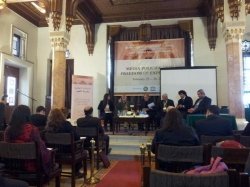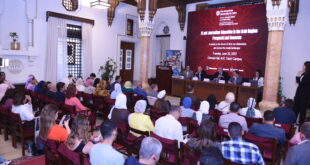Issue 21, spring 2015
https://doi.org/10.70090/CSESHA15
The School of Global Affairs and Public Policy at the American University in Cairo hosted a two-day conference on Media Policies and Freedom of Expression from February 25-26, 2015. The goal of the proceedings was to help strengthen legal and regulatory frameworks, especially in regard to freedom of expression in Egypt. The conference, which brought together media scholars, policymakers and industry players, was organized in collaboration with UNESCO, the League of Arab States and the Embassy of Finland.
The topics addressed included: Media policy in transitional democracies, the future of audio-visual media in Egypt, international models of media regulation, suggested models of independent media councils, freedom with responsibility under the purview of media laws, the role of independent public opinion centers, the role of media during elections, internet regulation in the Arab world, media codes of ethics particularly for radio and television, and media reform in Egypt.
The conference came at a critical time for both media policy and freedom of expression in Egypt, where policymakers and stakeholders have been collaborating to establish a legal framework to govern press laws in the country based on the 2014 Constitution, and the state has been facing mounting international criticism for measures seen as stifling freedom of expression. The following revisits some of the notable discussion during the conference.
Media Policy in a Transitional Context
Reconsidering the concept of policy, professor of media policy at the University of Westminster and keynote speaker Naomi Sakr challenged participants to understand policy development as part of a cycle. Any policy, Sakr emphasized, needs to be analyzed in relation to the wider context, both because of inevitable interactions and because of how policies are communicated.
In her discussion of successful examples of democratic transition and media, Sakr referenced Katrin Voltmer’s Mass Media and Political Communication in New Democracies, highlighting the interactive and interdependent nature of media and policy and how they, in turn, interact with populations. The ability for citizens to frame and communicate their expectations depends on the capabilities afforded to them by the media. In this context, the media’s role as a platform for debate and discussion cannot be understated.
Sakr also called into question the weight allocated to the idea of transition in the current regional context. The concept of transition implies a “before” and “after”, she said, which inevitably placing emphasis on the “after”. The resulting discourse tends to lack sufficient historical background and contextual framing.
Ultimately, Sakr concluded, those seeking to implement media policy must be realistic about the status quo, knowing that change is invariably seen as a threat to certain elements in society. Furthermore, to be effective, institutional reconstruction must take place across all sectors.
Egypt’s Media Landscape
Questions of Ownership and Ethics
Some of the most frequently cited issues revolved around questions of ownership, financing, ethics and professionalism. In his talk on the future of audiovisual media in Egypt, Osama El Sheikh, head of Al Nahar Television Network, argued that there is a complete lack of transparency in terms of media expenditure nationally. This extends to private entities, where ownership structures are nebulous and funding sources are often unclear. The media landscape in Egypt has stagnated, El Sheikh argued, because it is controlled by a small group of wealthy investors and there is a striking shortage of competent, ethical individuals. Despite this apparent scarcity, Dr. Heba Shahin, head of the Department of Mass Communication at Ain Shams University, argued it is imperative that those in the media rather than external entities draft any code of ethics.
Hassan Emad Mekkawy, head of the Department of Television and Broadcasting at Cairo University, continued the discussion of ethics in the context of the professional responsibilities of journalists. In agreement with international standards, Mekkawy argued, journalists have a responsibility to citizens and must operate accordingly. Sources should be obtained ethically. The work of journalists should not damage state security, be contemptuous of religion or hurtful to minorities; it should respect the facts, not be sensational and respect intellectual property rights. Conversely, media personnel should be free from coercion.
Beyond the ethical responsibilities of journalists, Mekkawy highlighted a number of the broader issues troubling Egyptian media. Among them; distorted or misleading information, biases toward some parties and against others, coverage that plays on the emotions of the public, a blackout of counter opinions, focus on and omissions of specific events, a lack of accountability for errors, unqualified individuals posing as experts, and the use of insults and obscenity to improve viewership numbers.
Still, Hisham Kassem, former publisher of Al Masry Al Youm expressed apprehension around the discussion of a code of ethics to be applied across the board. In an environment where you have some people trying and some not, attempting to implement a universal code of ethics may prove especially challenging. For example, argued Kassem, the same code of ethics cannot by applied to media personalities like Tawfik Okasha as is applied to others. Furthermore, said Kassem, it cannot be denied that individuals like Okasha have an audience; if they are overlooked in this process, a large subset of society is also being overlooked.
Structural and Economic Challenges
Head of the Department of Mass Communication at Minya University and Head of the Protection of Viewers’ Rights Association, Hassan Ali, agued that state television needs structural reconfiguration. In his discussion of the role of pressure groups and audience rights within media he articulated that while viewers are allocated several legal rights, and Egypt has long had experience with formal and informal pressure groups influencing content, there is no legal framework to deal with these groups. There are multiple entities influencing content from the business community to religious bodies to civil society organizations, we need to have solidarity in order to foster a healthy news environment, he argued.
Major components of the issue are the absence of a clear vision, questionable business practices, and poor resource allocation argued Hafez Al Mirazi, Director of the Kamal Adham Center for Television and Digital Journalism at the American University in Cairo. The Egyptian Radio and Television Union (ERTU) has upwards of 42 000 employees including 5000 security. The press is in a similar situation, where national newspapers have approximately 30 000 employees. Egypt is also facing major problems with licensing, where industry professionals are claiming and selling off frequencies. These, Al Mirazi argued, belong to the Egyptian people and should be given to the most eligible and qualified individuals rather than the highest bidder.
Emad Eldin Hussein, Editor-in-Chief at Al Shorouk newspaper, argued that the biggest challenge facing the media is economic in nature. The ERTU is unable to pay the salaries of its vast pool of employees, and is regularly taking out loans to cover these costs. Incentives should be given to successful institutions not to those that are failing. The economic issues also extend to private media, said Hussein, where private newspapers face challenges achieving wide circulation.
However any restructuring or reorganizing of the national media needs to closely examine the existing circumstances, argued Ali Abdel Rahman, Vice President of the Egyptian Radio and Television Union (ERTU). Who is going to finance reorganization? While there is an ongoing internal discussion about reorganization, explained Rahman, there is disagreement about funding.
The National Security and Freedom of Expression Conundrum
Mohamed Shuman, Dean of the Faculty of Mass Communication at the British University in Egypt addressed concerns about freedom of expression in the country’s media and posed the question: Is having only one voice going to be the prevailing status quo on the pretense of combatting terrorism or can we have a democratic press that also fights terrorism? A component of this quandary lies in an absence of clarity around what the relationship between the state and the media will be moving forward. It is unclear whether there is the intention to have real democracy, said Shuman; the political vision for the future must be established.
For Emad Eldin Hussein, freedom comes from balance in social situations, and Egypt is currently lacking in balance, both broadly speaking and with respect to the media. The more violence present in a society the less freedom there is. This presents the question: In order to face the real threat of terrorism, will the community be able to mobilize for press freedom? Perhaps in the long term, argued Hussein, but currently the state and security apparatus are exacerbating existing issues.
In his discussion of the foundations and implications of media regulation in the context of Islamic teachings (Shariah), Dr. Islam Abd Al-Raouf called for the urgent need to closely examine and combat terrorism and religious extremism within Egypt. He argued that religion addresses the human conscience and thus linking media codes with religious heritage inclusively would give greater strength to these efforts.
Regulation in the Regional Context
Keynote speaker Al-Nouri Allajmy, head of the Higher Independent Body for Audiovisual Communication in Tunisia offered insight into Tunisia’s post-revolution media landscape and efforts at reform. Tunisia’s newly established legal frameworks were promising for democracy and the exercise of freedoms, yet similarly to Egypt, these changes were not devoid of unprofessionalism in the media, which have had a negative impact on the overall environment. Allajmy highlighted the importance of media reform for the development of democracy, listing several of the newly established laws pertaining to media and freedom of expression.
Emphasizing the need for reform in the audiovisual sector, Allajmy mentioned the 2011 decree that established the audiovisual reform law. Chapter 5 of the decree explicitly defines respecting freedom of expression, equality, dignity and privacy. These components were taken and translated into actionable reform through the establishment of an audiovisual institution. At the time of the conference, the institution had recorded 33 violations against broadcasters for financial misconduct, instigating violence, unbalanced electoral coverage and violating the rights of children. Allajmy articulated the importance of these actions as these violations pose a threat to freedom of expression. Overall, Allajmy said, for these projects to be successful, an environment conducive to reform and good practices must be supported, where democratic culture is strengthened through balanced coverage and journalists are well trained.
Arab Media Moving Forward
In this environment lacking cohesion and professionalism, President of the Egyptian Radio and Television Institute, Gamal El Shaer, emphasized the importance of defining training parameters for media professionals. But beyond resistance toward retraining by those in the media, the budget allocated to training is a meager 0.3 percent of the overall ERTU budget, where the majority of resources are put toward paying salaries. In addition to greater investment in training, El Shaer argued that changes must be implemented legislatively and curriculum must extend beyond just presenting, instead taking a holistic approach including instruction in technology and language. He also recommended the establishment of an observatory and research center to operate collaboratively with the training program. There is a huge gap between the elite and the masses, argued El Shaer, the focus needs to be put on the younger generation and they need to be educated about their media rights.
The media expresses the ideas and opinions of its owners, explained Hisham Kassem. This year the Maspero’s deficit was 4.3 million EGP. There’s a disconnect between the media and the public, he argued, and with food and fuel shortages, individuals will not be willing to compromise food to sustain our media outlets. Kassem predicts this year will be one of substantial change, where the existing “media bubble” will burst and many newspapers will be dissolved.
Concluding Notes
Several recommendations emerged from the proceedings. Among them, media codes must be applied to adjust media processes and performance, the ownership of private satellite channels that are funded by advertising revenue should be organized, there is a need to develop laws specifically outlining the role of the Supreme Council of Press, the National Media Council and the Audio-Visual Media Council. Also highlighted was the importance of regulating the Internet in a manner that will not impinge on freedom of expression and flow of information. Further, the importance of media independence during elections was emphasized, particularly in the context of regulating advertising processes in order not to conflict with or mix media messaging. Finally, the importance of community radio as a tool for democratic transition was reemphasized.
 Arab Media & Society The Arab Media Hub
Arab Media & Society The Arab Media Hub





